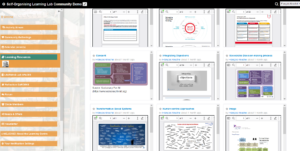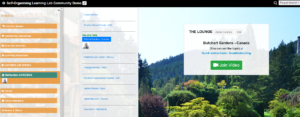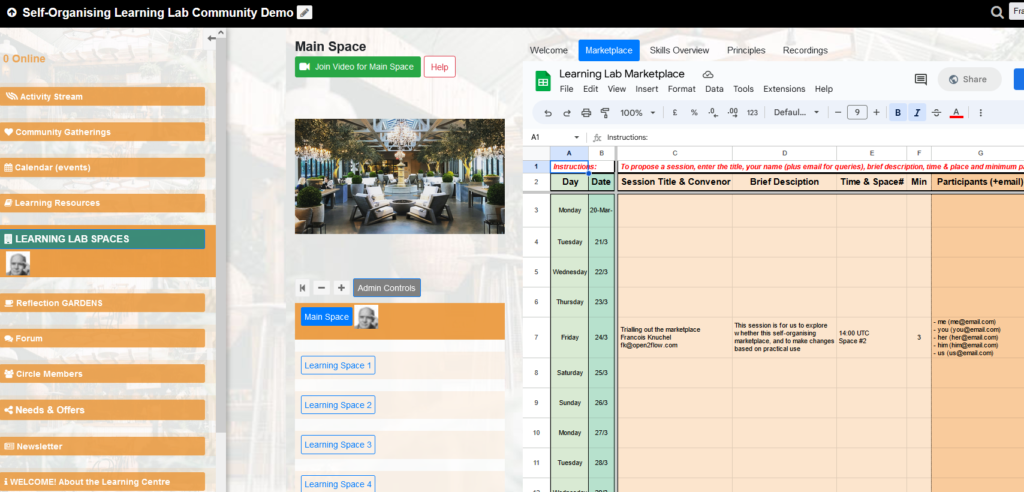Social Learning in Self-organised Organic Learning Centre
To survive and thrive in 21st-century humanity, society, organisations, communities and individuals need a new set of skills which enable us to work with unpredictability and complexity. The knowledge and skills we learned at school are no longer serving us, and while our education system needs a complete reinvention, we cannot wait for the next generation – we adults have to re-educate ourselves. Some of the new skills we need to learn are summarised in this Social Kata Skills for New Economy / Next-Stage Organisations sheet.
What is noticeable about these new skills is that they cannot be learned in the classical way we learned other skills at school, i.e. on our own in discreet testable chunks. These are very much fluid skills which cannot be learned by oneself, they can only be learned together with others, much like team sports or social dancing. The learning itself is a collaborative effort. We are ill-prepared to learn in this way, as it is not something our education system, focussed very much on individual learning, testing and competition, has equipped us with. In other words, learning itself has to be re-learned. I call this Social Learning.

The most important new skills that need to be learned can vary from person to person, from team to team and from organisation to organisation. Nowadays it is quite common to have “Communities of Practice”, these are small communities that practice certain skills. They are generally homogeneous, i.e. members do not vary a great deal. This can be both positive and negative: Positive because the same group can gain deeper learning and behave more coherently together; Negative because we find it is also necessary for people to practice with a diversity of people to disrupt habits gained from working with just one set of people. This is like the new learning that occurs every time partners change in social dancing.
For this reason, we have created Learning Labs. These are spaces where people from a learning network can come together and practice new skills, self-organising themselves between those who show up. This means every time different participants may be practising with different participants, thus creating natural diversity. They are thus less likely to become fixated by the habits of a particular set of participants. The Learning Labs are online and are specific to a particular organisation, though having civic community Learning Labs is also possible.
The Learning Labs are not stand-alone (as are classes or communities of practice), but are very much part of a wider learning community or organisation, and can be accessed by all members of that community. This means there is a vast pool of available learners to learn with, allowing for serendipitous cross-functional co-learning. Lab sessions can be run with a learning facilitator, or by the learners teaching each other and practising themselves in a self-organised way.
The backbone to what learners learn together are a number of sub-routines, each learned separately at first then combined, also called ‘Kata’ as in Japanese martial arts. While clumsy and ‘unnatural’ to begin with, once learned and consolidated (neural connections wired and reinforced) these ‘kata’ become automatic, in the same way operating the clutch and accelerator are automatic once learned — we do them without thinking about them, they become ‘natural’. These ‘kata’ would be described in the learning materials provided, like little recipes, except that in this case, we are dealing with social interactions, what I call ‘Social Kata’. The Learning Labs would also have spaces for deep dialogue where learners can reflect on the learning together in an emergent way.

The Learning Labs are rooms or spaces into which a set of learners can enter and have access to all materials they need to learn and practice together. Each room could focus on different sets of skills. There is a master ‘Marketplace, where people can post new practice sessions (title, time and place etc.) or where they can sign up for sessions already posted. This forms all part of the wider learning community.
The basic principles behind the peer-to-peer based self-organised learning labs or communities are: SOLE (Self-Organised Learning Environments), inspired by Sugata Mitra’s Hole in the Wall experiment, and Open Space Technology, inspired by Harrison Owen.
The online Learning Labs are therefore designed into a wider online community space. The community has the forums, communication channels, and meeting facilities one would expect of a regular community, including regular town hall meetings for the whole community. The Learning Labs are a separate area but very much built into the community space. Below is a demonstration of how this might work in practice.
Learning Lab Demo
If you’re organisation or community is interested in creating your own Learning Lab Community, please contact us using the contact form.

